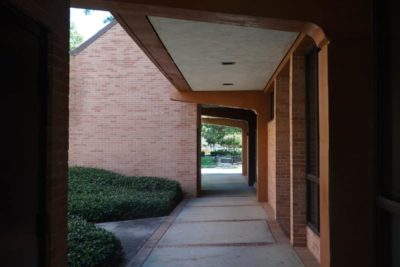This is a copy of the Awake58 newsletter originally sent on Tuesday, October 22, 2019. Click here to subscribe.
A cyberattack hit Richmond CC, but more are coming… How do we plug the summer melt leak in the education pipeline? We explored interventions… The higher education bill dropped and the Washington Post explores hits and misses…
A cyberattack hit Richmond Community College in July. The attack caused the college to get creative with their response. As Alex previously reported, “They began registering people with paper, the way it was done more than a decade ago. They rigged up phones for receptionists in key positions, so that people could get in touch with the college. Meanwhile, everyone else was mostly using cell phones for email, communications, and even computing.”
The attack on Richmond CC was actually a ransomware attack — where hackers encrypt data and then offer to give it back for a price. And it is reasonable to expect additional attacks in the future. After all, the state’s 58 community colleges are essentially 58 multimillion-dollar businesses.
In light of the possibility of future attacks, Jim Parker, Chief Information Officer for the North Carolina Community College System, and his team are working with college presidents and others to figure out how to best shape IT at the colleges to increase the effectiveness of their responses moving forward. For his recommendations and more on how Richmond CC responded, check out Alex’s article from the most recent State Board of Community Colleges meeting.
We also expect to hear more about the state budget this week. Stay tuned!
Thank you for being with us,
Nation
If you like this email, share the link to subscribe on your social network of choice or forward it to a friend. If you’re seeing this email thanks to someone sending it to you, subscribe here to get it every week. If you missed last week’s newsletter, you can find it by clicking here.
EdNC reads
More cyberattacks are coming. How will community colleges handle them?
Richmond CC faced a cyber attack this summer, but other colleges are likely to face one in the near future. Jim Parker said the state’s 58 community colleges are essentially 58 multimillion-dollar businesses, which makes them vulnerable to cyberattacks. But he said he thinks Richmond wasn’t an isolated target in this instance but rather got caught up in a larger, perhaps nationwide, attack. For more on the previous attack on Richmond CC, check out our story on how they responded.
How might we plug the summer melt leak in NC’s leaky pipeline?
Every year, a significant portion of high school graduates who were planning to enroll in college fail to do so. This is a phenomenon known as “summer melt,” and it’s the largest leak in North Carolina’s education pipeline. This story features research and analysis on interventions that your college might consider.
President of Central Piedmont Community College, Dr. Kandi Deitemeyer, discusses the role of community colleges
“If you’ve been paying attention to the work of the myFutureNC Commission, that challenge involves raising up an additional 400,000 adults by 2030 with an education credential beyond high school. That is the kind of challenge Dr. Kandi Deitemeyer, president of Central Piedmont Community College, has been thinking about for most of her adult life.” Listen to her podcast with the Institute for Emerging Issues for her perspective.
MC Belk Pilon, President and Board Chair of the John M Belk Endowment, shares her vision
MC Belk Pilon, the president and board chair of the John M. Belk Endowment whose mission is to transform postsecondary educational opportunities to meet North Carolina’s evolving workforce needs, joined the First in Future podcast to share her vision for the work moving forward — including the origins of the myFutureNC Commission.
Other reads
The House higher education bill is introduced
As my colleague Mebane said last week, it’s more than 1,000 pages long, but here is H.R. 4674, “To amend and strengthen the Higher Education Act of 1965 to lower the cost of college for students and families, to hold colleges accountable for students’ success, and to give a new generation of students the opportunity to graduate on-time and transition to a successful career.” The Washington Post spoke to policy experts who outlined, “Hits and misses in the House higher education bill.”
One college’s solution to the struggle for internet access for their students
An employee at San Juan College was inspired by a project from the New York City Library where they distributed internet hotspots to 10,000 families. He bought ten hotspots with funds from the college foundation’s endowment and allowed the hotspots to be checked out by students for internet access at home.
How outcomes metrics can better reflect community college performance
The think tank Third Way articulates a vision for metrics around community college performance: “When it comes to evaluating the performance of two-year institutions, traditional outcomes metrics can provide an incomplete picture, failing to account for the multiple missions of community colleges… They often fail to fully measure the true value that community colleges provide—leaving students and taxpayers in the dark about which two-year schools are delivering on their promises and which ones are not.”
In a North Carolina county where few Latino parents have diplomas, their kids are aiming for college
In Sampson County, the percentage of Latino students is now 40%. What efforts are underway to try to bolster attainment in this county and others? Hechinger Report traveled to Sampson County to report.
Around North Carolina
Builders fear their shortage of workers is more than a symptom of a strong economy
The News and Observer has the story: “Unlike other industries, those involved in construction say their labor shortages are only partly explained by the strong economy. They say a more fundamental shift toward four-year colleges and high-tech has meant fewer young people seeking careers in construction, even in more skilled fields such as electrical and plumbing. Many consider construction a job you do if you can’t get something better.”
Q&A with NC Community College System President Peter Hans
Peter Hans explains the reason the system office pushed hard for parity funding for continuing education: “Because traditional academic programs were funded at a rate that was 34% higher than workforce training programs, colleges tended to offer vocational and trade programs in the longer format. Often, that meant that students were placed in sequential programs over several semesters rather than in short-term training courses.”
Cape Fear CC offering tuition-free classes to homeschooled students
Cape Fear CC is now offering tuition-free classes to homeschooled students. Their target market? “According to the North Carolina Department of Administration’s 2019 Home School Statistical Summary, there are 2,194 homeschooled students in New Hanover County and 1,100 in Pender County.”
Sign-up for more EdNC.org!
Sign-up for our other EdNC newsletters and become more informed about North Carolina and beyond. Our goal is to engage and connect you to your state.
Join Early Bird to receive essential news and resources on our earliest learners — including the latest information on early childhood educator prep.
Monday through Friday, we send out essential content, links, and information for everyone who cares about education in North Carolina. Sign-up for the Daily Digest to receive it each morning.
For a weekly overview of education news across North Carolina, subscribe to EducationNC’s Weekly Wrapup.
Reach NC Voices was built with people at the core. We work to bring your voice into public policy debates across our state. Weigh in on weekly conversations about policy issues in North Carolina by joining Reach NC Voices.
Policy research, trends, and analysis matters. If you agree you might like the Center’s weekly policy email, Friday@Five. You can subscribe here.
Would you like to know more about STEM education in North Carolina?Subscribe to our monthly STEM newsletter, EdNC STEM.
Recommended reading



